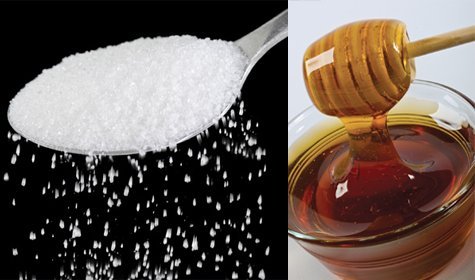“Can I still add Sweet’N Low to my tea and lose weight? “Are agave and honey really healthier alternatives compared to artificial -sweeteners?”
Chances are, you’ve probably asked yourself these questions while trying to decide between Splenda and Equal, or if you’re more of an au naturel fan, with agave or honey. Whether you’re attempting to boost fat loss, maintain your current weight or simply make healthier lifestyle choices, cutting down on all forms of added sugar is essential.
Is honey actually better for you?
Brenda Bustillos, M.S., R.D.N, L.D., a registered dietician with the Texas A&M Health Science Center School of Public Health tackles the daunting question: What type of sweetener is considered the best for your health goals?
First things first, what exactly is the difference between naturally occurring sugars and artificial sweeteners? “The biggest difference is in the chemical makeup,” Bustillos said. “Sugar substitutes are chemically generated, with the exception of Stevia which is plant-based and thus chemically extracted. They are non-nutritive which means they have little to no calories and no nutritional value. Naturally-occurring sweeteners like agave, honey and coconut sugar are called nutritive sweeteners – because they do provide the body with certain nutrients, primarily carbohydrates.”
Bustillos said she would recommend someone try artificial sweeteners if their goal is weight loss. “Since non-nutritive sweeteners have little to no caloric value they may be ideal for a person who wants to boost weight loss. However, the preference is really up to the individual. You should try out different non-nutritive sweeteners and determine which is best for you.”
Sugar has been painted as the enemy of good health, and because of this, people flock in droves to the organic aisle of grocery stores in search of healthier alternatives. But, does swapping high-fructose corn syrup for agave really mean you’re being more responsible about your sugar intake?
Unfortunately naturally occurring sugars (such as those found in honey, agave, other plant sources) are still sugars, and your body metabolizes them similarly, meaning they have equal adverse effects. “We need to be careful because substances labeled as “natural” can still be detrimental to our nutritional health if we over-consume them,” Bustillos said. Nutritive sweeteners like agave, coconut sugar, honey and molasses have a caloric value to their servings. This means you’re still putting empty calories into your body.”
It’s no secret that the American diet is saturated in sugar and that most Americans consume more sugar than necessary. The liver can normally process six to nine teaspoons of sugar a day, but the average American consumes 19.5 teaspoons or more a day.
According to Bustillos, moderation is key. “If you over-consume any form of added sugar and calorie dense foods and beverages you will still have trouble with weight loss. Furthermore, excess body weight can increase your risk of diabetes and heart disease,” Bustillos said. “Essentially, we need a better understanding of what caloric moderation means for our individual needs and goals.”
“It really doesn’t matter if you prefer Splenda to a splash of agave syrup in your coffee – the dialogue we need to have with ourselves is making common sense decisions for our health,” she said.
Texas A&M Health Science Center is Transforming Health through innovative research, education and service in dentistry, medicine, nursing, pharmacy, public health and medical sciences. Original article: http://news.tamhsc.edu/?post=you-asked-what-is-the-healthiest-sweetener

